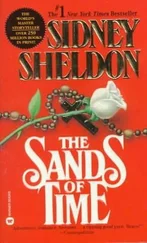“Harrison, I want you to make me a promise,” Judd said.
“What kind of promise?” Burke asked warily.
“If they are trying to trick you, then they want you to do something violent so they can have you locked up… But you’re too smart for that. No matter how they provoke you, I want you to promise me that you won’t do anything to them. That way, they can’t touch you.”
Burke’s eyes lit up. “By God, you’re right,” he said. “So that’s their plan! Well, we’re too clever for them, aren’t we?”
Outside, Judd heard the sound of the reception room door open and close. He looked at his watch. His next patient was here.
Judd quietly snapped off the tape recorder. “I think that’s enough for today,” he said.
“You got all this down on the tape recorder?” Burke asked eagerly.
“Every word,” Judd said. “No one’s going to hurt you.” He hesitated. “I don’t think you should go to the office today. Why don’t you go home and get some rest?”
“I can’t,” Burke whispered, his voice filled with despair. “If I’m not in my office, they’ll take my name off the door and put someone else’s name on it.” He leaned toward Judd. “Be careful. If they know you’re my friend, they’ll try to get you, too.” Burke walked over to the door leading to the corridor. He opened it a crack and peered up and down the corridor. Then he swiftly sidled out.
Judd looked after him, his mind filled with the pain of what he would have to do to Harrison Burke’s life. Perhaps if Burke had come to him six months earlier…And then a sudden thought sent a chill through him. Was Harrison Burke already a murderer? Was it possible that he had been involved in the deaths of John Hanson and Carol Roberts? Both Burke and Hanson were patients. And they could have easily met. Several times in the past few months Burke’s appointments had followed Hanson’s. And Burke had been late more than once. He could have run into Hanson in the corridor. And seeing him several times could easily have triggered his paranoia, made him feel that Hanson was following him, threatening him. As for Carol, Burke had seen her every time he came to the office. Had his sick mind conceived some menace from her that could only be removed by her death? How long had Burke really been mentally ill? His wife and three children had died in an accidental fire. Accidental? Somehow, he had to find out.
He went to the door leading to the reception office and opened it. “Come in,” he said.
Anne Blake rose gracefully to her feet and moved toward him, a warm smile lighting her face. Judd felt again the same heart-turning feeling that had hit him when he had first seen her. It was the first time that he had felt any deep emotional response toward any woman since Elizabeth.
In no way did they look alike. Elizabeth had been blond and small and blue-eyed. Anne Blake had black hair and unbelievable violet eyes framed by long, dark lashes. She was tall, with a lovely, full-curved figure. She had an air of lively intelligence and a classic, patrician beauty that would have made her seem inaccessible, except for the warmth in her eyes. Her voice was low and soft, with a faint, husky quality.
Anne was in her middle twenties. She was, without question, the most beautiful woman Judd had ever seen. But it was something beyond her beauty that caught at Judd. There was an almost palpable force that pulled him to her, some unexplainable reaction that made him feel as though he had known her forever. Feelings that he had thought long since dead had suddenly surfaced again, surprising him by their intensity.
She had appeared in Judd’s office three weeks earlier, without an appointment. Carol had explained that his schedule was full and he could not possibly take on any new patient. But Anne had quietly asked if she could wait. She had sat in the outer office for two hours, and Carol had finally taken pity on her and brought her in to Judd.
He had felt such an instant powerful emotional reaction to Anne that he had no idea what she said during the first few minutes. He remembered he had asked her to sit down and she had told him her name, Anne Blake. She was a house-wife. Judd had asked her what her problem was. She had hesitated and said that she was not certain. She was not even sure she had a problem. A doctor friend of hers had mentioned that Judd was one of the most brilliant analysts in the country, but when Judd had asked her who the doctor was, Anne had demurred. For all Judd knew, she could have gotten his name out of the telephone directory.
He had tried to explain to her how impossible his schedule was, that he simply was unable to take on any new patients. He offered to recommend half a dozen good analysts. But Anne had quietly insisted that she wanted him to treat her. In the end Judd had agreed. Outwardly, except for the fact that she appeared to be under some stress, she seemed perfectly normal, and he was certain that her problem would be a relatively simple one, easily solved. He broke his rule about not taking any patient without another doctor’s recommendation, and he gave up his lunch hour in order to treat Anne. She had appeared twice a week for the past three weeks, and Judd knew very little more about her than he had known when she first came in. He knew something more about himself. He was in love—for the first time since Elizabeth.
At their first session, Judd had asked her if she loved her husband, and hated himself for wanting to hear her say that she did not. But she had said, “Yes. He’s a kind man, and very strong.”
“Do you think he represents a father figure?” Judd had asked.
Anne had turned her incredible violet eyes on him. “No. I wasn’t looking for a father figure. I had a very happy home life as a child.”
“Where were you born?”
“In Revere, a small town near Boston.”
“Are both your parents still alive?”
“Father is alive. Mother died of a stroke when I was twelve.”
“Did your father and mother have a good relationship?”
“Yes. They were very much in love.”
It shows in you, thought Judd happily. With all the sickness and aberration and misery that he had seen, having Anne here was like a breath of April freshness.
“Any brothers or sisters?”
“No. I was an only child. A spoiled brat.” She smiled up at him. It was an open, friendly smile without guile or affectation.
She told him that she had lived abroad with her father, who was serving in the State Department, and when he had remarried and moved to California, she had gone to work at the UN as an interpreter. She spoke fluent French, Italian, and Spanish. She had met her future husband in the Bahamas when she was on vacation. He owned a construction firm. Anne had not been attracted to him at first, but he had been a persistent and persuasive suitor. Two months after they met, Anne had married him. She had now been married for six months. They lived on an estate in New Jersey.
And that was all Judd had been able to find out about her in half a dozen visits. He still had not the slightest clue as to what her problem was. She had an emotional block about discussing it. He remembered some of the questions he had asked her during their first session.
“Does your problem involve your husband, Mrs. Blake?”
No answer.
“Are you and your husband compatible, physically?”
“Yes.” Embarrassed.
“Do you suspect him of having an affair with another woman?”
“No. “ Amused.
“Are you having an affair with another man?”
“No.” Angry.
He hesitated, trying to figure out the best approach to take to break down the barrier. He decided on a buckshot technique: he would touch on every major category until he struck a nerve.
Читать дальше











